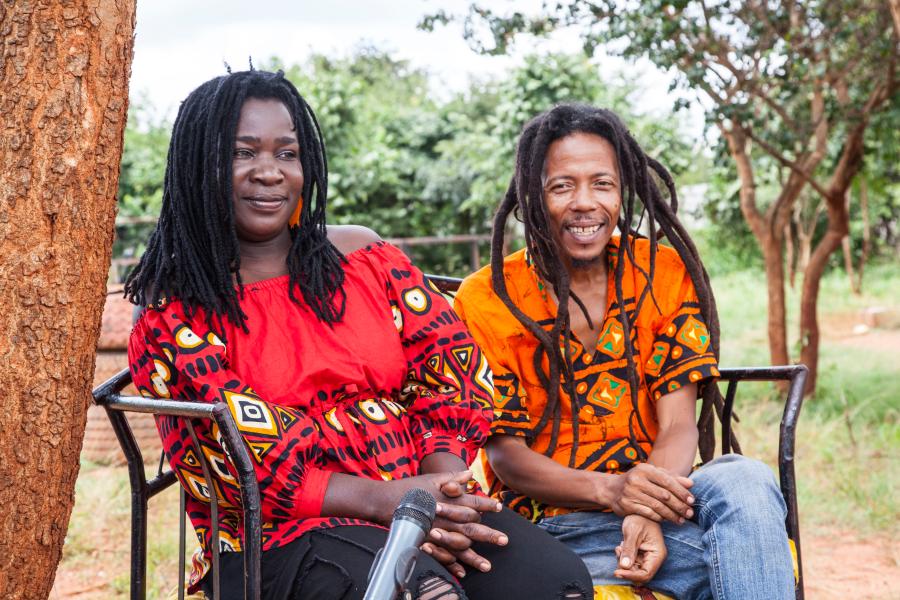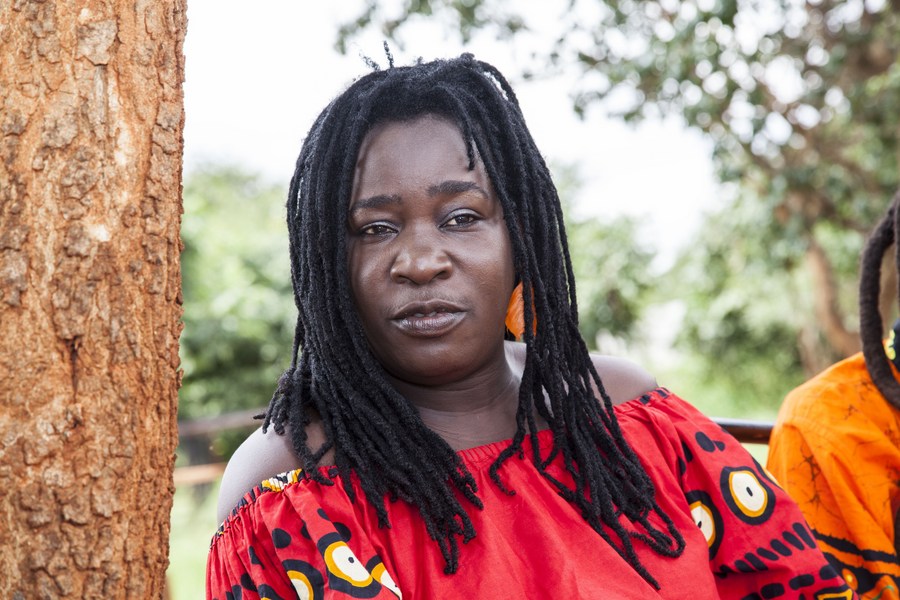
Zambia's popular female musician Daputsa Nkhata-Zulu (L) and her husband Maiko Zulu receive an interview with Xinhua in Lusaka, Zambia, March 24, 2021. (Photo by Martin Mbangweta/Xinhua)
Zambia's popular female musician, Daputsa Nkhata-Zulu, says resorting to bleaching products to lighten skin color among some African women is a sign of having an inferiority complex and encourages her peers to be proud of their African heritage.
LUSAKA, March 31 (Xinhua) -- Zambia's popular female musician, Daputsa Nkhata-Zulu, said she has grown up being taunted because of being "extra black".
"I started experiencing this bullying because of my dark skin, I think, at a very young age in primary school, even at home when we were playing. Whatever you would want to do, you know, maybe to expose your talent, or just be good at something, somebody would just come in and attack you using your skin," she said in a recent interview with Xinhua.
She said the bullying has worsened in the advent of social media because each time she posts something people would rather comment about her skin instead of commenting on the issue being raised.
However, this has not dampened her spirit or forced her to resort to bleaching her skin, a thing that is common among many African women.
The popular musician, who released the song "Makaladi Ngon'ga" (fake white people) in her debut album highlighting the issue of skin bleaching, has refused to be cowed down and says she will never bleach her skin because she is proud of who she is.
"So, those things have always been part of my life. It is something that has affected me but I have grown out of it. It is believing in myself and loving myself and accepting who I am that has helped me," she said.
She said that the best thing for her has been to accept the situation and to maintain a positive attitude no matter what people say.
According to her, it is important for African women to accept who they are instead of resorting to bleaching their skins, adding that it is a sign of having an inferiority complex.

Zambia's popular female musician Daputsa Nkhata-Zulu receives an interview with Xinhua in Lusaka, Zambia, March 24, 2021. (Photo by Martin Mbangweta/Xinhua)
Asked what could be the reasons behind the use of bleaching creams among African women, the musician said this could be how the women are portrayed in the media and on television where white skin is seen as superior.
She said she has been using her influence as a musician as well as social media platforms to talk to women who have suffered abuse because of their black skin.
The AfriPride initiative is aimed at reaching out to the women suffering bullying. "I have been talking to a lot of women who have expressed what they are going through and I have been telling them my experience and to remain strong," she said.
With the encouragement of her husband, Maiko, who is also a musician, she has also been talking to girls in schools to encourage them to be proud of their African heritage.
On his part, Maiko has encouraged women to be proud of their heritage and skin and not to be used by pharmaceutical companies that are taking advantage of them by manufacturing skin bleaching creams.
According to the World Health Organization (WHO) figures, about 40 percent of African women regularly use skin lightening or bleaching creams with the trend spreading in many parts of the continent.
However, due to the negative side effects, some African countries such as Rwanda and South Sudan have banned the use of skin bleaching products.
Beatrice Kunda, the founder of Natural Ebuntu Beauty Solutions, who used to be addicted to bleaching her skin and developed side-effects, now has developed remedies to treat skin affected due to bleaching.
She said she has come up with a number of remedies she is using to treat women whose skin has been affected due to excessive bleaching.
Kunda, who has been treating skin bleaches for the last 14 years, reveals that bleaching results in damage to the skin because the creams remove skin layers, exposing the person to heat from the sun. ■




